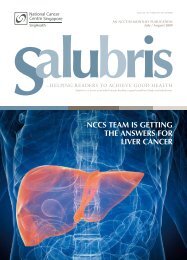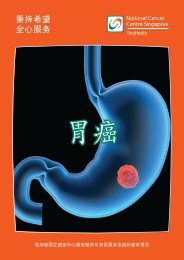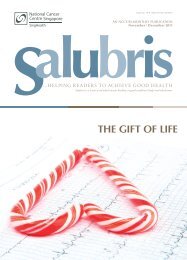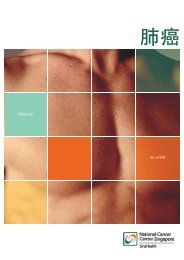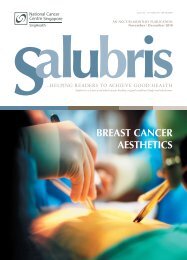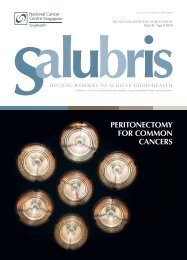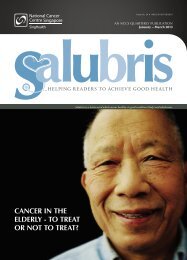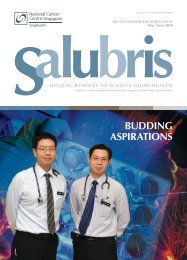Medical Professionals Version - National Cancer Centre Singapore
Medical Professionals Version - National Cancer Centre Singapore
Medical Professionals Version - National Cancer Centre Singapore
You also want an ePaper? Increase the reach of your titles
YUMPU automatically turns print PDFs into web optimized ePapers that Google loves.
PAGE A3<br />
In Other Words<br />
SALUBRIS<br />
July / August 2009<br />
“Despite the slew of<br />
exciting drugs coming<br />
through, we remain<br />
cautiously optimistic,<br />
and at the end of the day,<br />
patient care and safety<br />
remains the priority.“<br />
Dr Daniel Tan<br />
However, beyond the high tech<br />
translational science, he added “I<br />
would say I still derived the greatest<br />
satisfaction treating patients and seeing<br />
them get better. Some of the patients I<br />
met at the hospital were also refreshingly<br />
enlightened. They participated in trials<br />
with the hope of helping others even<br />
though there was a chance that it would<br />
not benefit them,” he added.<br />
As the Young Investigator Award is given<br />
to applicants during their transition<br />
from a fellowship programme to a<br />
faculty appointment, it was shortly<br />
before he returned to <strong>Singapore</strong> that he<br />
received this honour.<br />
“I am glad that the proposal came<br />
through the peer-review process and was<br />
selected for funding by a highly regarded<br />
international scientific body. The most<br />
satisfying part is to have articulated an<br />
idea in the proposal and have someone<br />
take it seriously to the extent of providing<br />
funding, all in good faith,” he said.<br />
The grant from the award would go into<br />
his research on ‘Delineating Clinically<br />
Relevant Targets of Anti-Angiogenic<br />
Small Molecule Tyrosine Kinase Inhibitors<br />
in Nasopharyngeal Carcinoma’.<br />
“To put that simply, I am trying to<br />
understand why resistance develops in<br />
drugs targeting blood vessels, as well as<br />
find out how they work in nasopharyngeal<br />
cancer which affects about 400<br />
<strong>Singapore</strong>ans each year,” he explained.<br />
Now that Dr Tan is back, the clinicianscientist<br />
has to divide his time between the<br />
NCCS-VARI Laboratory, where he works<br />
with his mentor Prof Teh Bin Tean, and<br />
the clinic where he sees patients suffering<br />
from a range of different tumour types.<br />
Dr Tan was upfront about his role as an<br />
oncologist. “At first, I had reservations<br />
about a lifelong career in oncology.<br />
But I soon found it to be both a<br />
privilege and an extremely fulfilling<br />
undertaking to care for cancer patients.”<br />
Indeed for someone who is developing<br />
new drugs in oncology, Dr Tan remains<br />
circumspect on the role of a physician.<br />
“Despite the slew of exciting drugs<br />
coming through, we remain cautiously<br />
optimistic, and at the end of the day,<br />
patient care and safety remains the<br />
priority. Hopefully, our research efforts<br />
will shed some light to the current gaps<br />
in understanding cancer, and ultimately<br />
translate to improved care for patients.”<br />
Off work, this 31-year-old is on a constant<br />
quest to discover new gastronomic highs.<br />
He regularly goes for runs, waxes lyrical<br />
about wine together with good friends,<br />
and challenges himself to a therapeutic<br />
game of golf, when time avails.<br />
By Carol Ang



